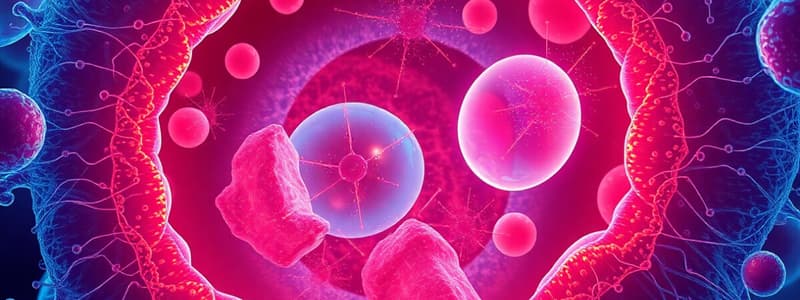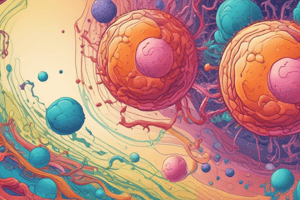Podcast
Questions and Answers
What role does the vacuole play in a plant cell?
What role does the vacuole play in a plant cell?
- It controls cell activities by housing DNA.
- It facilitates chemical reactions in a liquid medium.
- It contains cell sap and helps in storage and support. (correct)
- It generates energy through respiration.
What is the main function of the cell membrane?
What is the main function of the cell membrane?
- To store nutrients and waste materials.
- To carry out chemical reactions.
- To control the movement of particles in and out of the cell. (correct)
- To provide structure to the cell.
What is the primary component of cytoplasm?
What is the primary component of cytoplasm?
- Lipids
- Cell membrane
- Water (correct)
- Nucleic acids
Which statement correctly describes chlorophyll's function?
Which statement correctly describes chlorophyll's function?
What does it mean for a membrane to be partially permeable?
What does it mean for a membrane to be partially permeable?
What is the primary function of the chloroplast?
What is the primary function of the chloroplast?
Which structure is responsible for controlling cell functions?
Which structure is responsible for controlling cell functions?
What is a key function of the cell membrane?
What is a key function of the cell membrane?
Which structures are present only in plant cells?
Which structures are present only in plant cells?
What role does the vacuole play in plant cells?
What role does the vacuole play in plant cells?
Which statement about the cytoplasm is accurate?
Which statement about the cytoplasm is accurate?
What is the function of the cell wall?
What is the function of the cell wall?
Which cell type is primarily responsible for transport of water in plants?
Which cell type is primarily responsible for transport of water in plants?
What is the primary function of the nucleus in a cell?
What is the primary function of the nucleus in a cell?
Which part of a cell is responsible for protecting it and controlling the transport of substances?
Which part of a cell is responsible for protecting it and controlling the transport of substances?
What role do chloroplasts play in plant cells?
What role do chloroplasts play in plant cells?
What is the primary composition of the cell wall in plant cells?
What is the primary composition of the cell wall in plant cells?
Which of the following cellular structures is primarily involved in respiration?
Which of the following cellular structures is primarily involved in respiration?
Which part of the cell is described as being made up mainly of water and the site of chemical reactions?
Which part of the cell is described as being made up mainly of water and the site of chemical reactions?
Which structure is responsible for protein synthesis in the cell?
Which structure is responsible for protein synthesis in the cell?
What is a key difference between plant and animal cells regarding their structure?
What is a key difference between plant and animal cells regarding their structure?
Which structures are present in both animal and plant cells?
Which structures are present in both animal and plant cells?
Which structures are exclusively found in plant cells?
Which structures are exclusively found in plant cells?
What is the primary function of the chloroplast?
What is the primary function of the chloroplast?
What role does the cell membrane serve?
What role does the cell membrane serve?
What is the main function of the cell wall?
What is the main function of the cell wall?
What is NOT a function of the cytoplasm?
What is NOT a function of the cytoplasm?
What is a characteristic of ribosomes?
What is a characteristic of ribosomes?
Which statement about bacteria is true?
Which statement about bacteria is true?
Flashcards are hidden until you start studying
Study Notes
Cell Structures and Functions
- Cell Membrane: Protects the cell and controls the movement of substances in and out; semi-permeable.
- Cytoplasm: Gel-like substance where metabolic reactions occur; mainly composed of water.
- Nucleus: Contains DNA; controls all cell activities and protein synthesis.
- Cell Wall: Composed of cellulose; provides support and protection to plant cells, allowing passage of substances.
- Chloroplast: Site of photosynthesis; contains chlorophyll to convert light energy into chemical energy.
- Vacuole: Stores water and mineral ions; provides rigidity and support in plant cells.
- Mitochondria: Powerhouse of the cell; site of aerobic respiration, releasing energy.
- Ribosomes: Involved in protein synthesis; not membrane-bound.
Types of Cells and Differences
- Animal Cells: Have a flexible shape; contain cell membrane, cytoplasm, nucleus, and mitochondria.
- Plant Cells: Have rigid structure due to the cell wall; contain cell membrane, cytoplasm, nucleus, vacuole, and chloroplasts.
Key Functions
- Nucleus Function: Controls cell activities, including growth, metabolism, and reproduction.
- Photosynthesis Role of Chloroplast: Converts light energy into glucose, essential for plant life.
- Function of Cell Membrane: Selectively allows substances to enter or exit, maintaining homeostasis.
- Cell Wall Function: Gives the plant cell its shape and withstands internal pressure.
- Vacuole's Role in Plants: Maintains turgor pressure, supports cell structure, and stores nutrients.
Common Structures in Cells
- Both plant and animal cells possess cell membrane, nucleus, and cytoplasm.
- Unique to plant cells are the cell wall, chloroplast, and large central vacuole.
Additional Concepts
- Fully Permeable: Allows all substances to pass through.
- Partially Permeable: Allows only certain substances to pass through, as seen in cell membranes.
- Cell Sap: A liquid found in vacuoles, containing dissolved nutrients and waste products.
Comparison of Cell Types
- Prokaryotic Cells: Simple structures without a nucleus, containing DNA and cell wall.
- Eukaryotic Cells: Complex structures with a nucleus and membrane-bound organelles.
Summary of Organelles
- Cellular Organization: Both prokaryotic and eukaryotic cells contain a cell membrane and cytoplasm; eukaryotic cells have a nucleus and organelles.
- Active Cellular Functions: Organelles like mitochondria and ribosomes are crucial for energy production and protein synthesis, respectively.
Studying That Suits You
Use AI to generate personalized quizzes and flashcards to suit your learning preferences.




